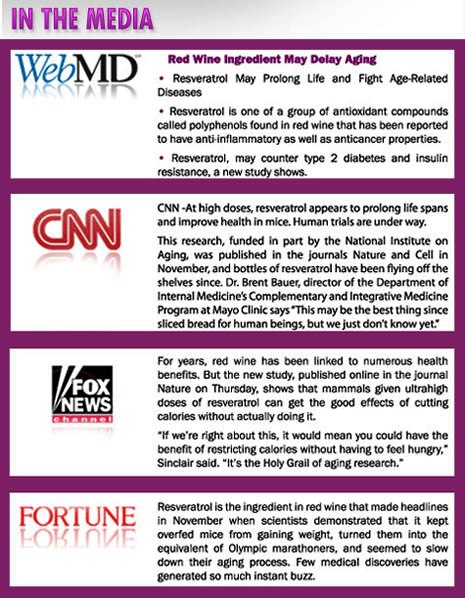How To Slow Aging With Resveratrol
Resveratrol first came to public attention when it was discovered to be a constituent of red wine following a report that French men who drank moderate amounts of red wine did not have some of the age related diseases that their American counterparts in the same age group suffered frequently.
Let's take a look at how to slow aging with Resveratrol
First, resveratrol is a powerful antioxidant, that have been shown to reduce the number of free radicals in the blood that are waste products of cellular functions and a contributing factor to the aging process. It has been linked to weight loss and sold as a dietary supplement to help people burn fat for many years.
The ability to slow aging with Resveratrol had not been proven until recently. In many ways, resveratrol works on the body in a similar fashion to caloric restriction, a diet plan that involves consuming quantities of food low in calories and rich in nutrients and fiber. Caloric Restriction has been shown to slow the aging process and reduce the chances of developing most of the diseases we normally associate with aging.
However, why spend years of misery with a resticted low calorie diet, the minute you can take advantage of similar results produced by Resveratrol, which "mimics" the beneficial mechanisms of the caloric restriction diet? See a thorough description of the health benefits of resveratrol, and get your FREE trials today.
The precise action of how to slow aging with resveratrol is not entirely understood, but in tests in mice where one group was fed a normal diet, another a high fat diet, and a third a high fat diet supplemented with resveratrol, the blood levels of glucose and cholesterol, and the blood pressure of the mice on the high fat diet with resveratrol were substantially lower than the group with just a high fat diet. In fact, they were remarkably similar to the group on a normal diet. Read about the French Paradox, which triggered more intensive studies examining the health benefits of resveratrol.
It is believed that resveratrol works to block the absorption of certain fats inside the body and helps to flush them on through the digestive tract and out of the body. In addition, it bonds with certain bad cholesterol types and triglycerides to keep them from building up in the body. To start experiencing yourself the cardiovascular health benefits of resveratrol, do not delay. Get your FREE trials today.
Other studies are showing promising signs that resveratrol works at a genetic level to deactivate the gene most responsible for aging. If these studies prove out, resveratrol may well become known as the proverbial fountain of youth. According to Dr. Sinclair at Harvard Medical School, Resveratrol slows aging by seeking out the aging gene and shutting it off.
It has definitely been shown that this compound works to inhibit, or even prevent, certain types of cancers, most notably breast cancer in women. Read more about the anti-cancer health benefits of resveratrol and its life extension potential.
Curiously, despite its presence in red wine, grapes, mulberries, and other foods, resveratrol is not well absorbed from the foods we eat. In order to get the sort of benefits these studies show it can possibly have, it must be taken in high doses as a dietary supplement. We so strongly believe in the benefits of resveratrol we have experienced ourselves that we want to encourage you to get your FREE supplements today and check themout for yourself.
Measurements taken of body absorption show that the compound is best absorbed sublingually by holding a solution in the mouth containing resveratrol. In pill or capsule form, it takes a minimum of 250 mg to produce a measurable amount in the blood after 30 minutes and all traces of that are gone after 4 hours. This seems to indicate that supplementation with resveratrol should be taken at regular intervals that do not exceed 4 hours to maintain sufficient levels in the blood to be of benefit for slowing the aging process. Try various FREE trials and read more on how to slow aging with Resveratrol
Filed under Blog, Anti Aging Research, Beneficial Supplements by ![]()



Leave a Comment